Affiliate links on Android Authority may earn us a commission. Learn more.
The best wireless earbuds to spend your money on
November 29, 2024











With so many options, picking the best wireless earbuds can be tricky. From active noise canceling (ANC) and custom sound profiles to basics like your budget or platform of choice, there are many things to consider before you buy. We have reviewed the best wireless earbuds to help you find the perfect fit for your needs. Although we focus on the best earbuds for Android, we have not neglected iPhone owners.
Follow the buyer’s guide below to brush up on your earbud knowledge. Otherwise, let us introduce you to the Sony WF-1000XM5.
The Sony WF-1000XM5 are the best wireless earbuds for most people


The Sony WF-1000XM5 are a cut above the rest. These earbuds boast premium build quality and even more powerful ANC than the WF-1000XM4 before them. This, combined with the array of customization options, makes the WF-1000XM5 our pick for the best earbuds for Android.
Sony slimmed down the WF-1000XM5, making them 25% smaller and 20% lighter than their predecessors. Our sister site, SoundGuys, found the WF-1000XM5 notably more comfortable than the WF-1000XM4. Sony retained many of the things we loved about the WF-1000XM4. For example, the new flagship earbuds have the same IPX4 water-resistant build. That means you can exercise with them — just make sure you dry them off before putting them back in the case.
The WF-1000XM5 have excellent low-frequency noise cancelation. With ANC on, airplane engines will sound one-quarter to one-eighth as loud as they would without the buds. The WF-1000XM5 also shine when it comes to blocking out high-frequency noises. Securing a robust seal means these types of sounds are essentially muted. Wearing the WF-1000XM5 will make it nearly impossible to hear keyboard clicks and background chit-chat. We attribute this improved passive isolation to the memory foam ear tips. Listeners unsure which ear tips to pick can take a test in the free mobile app.
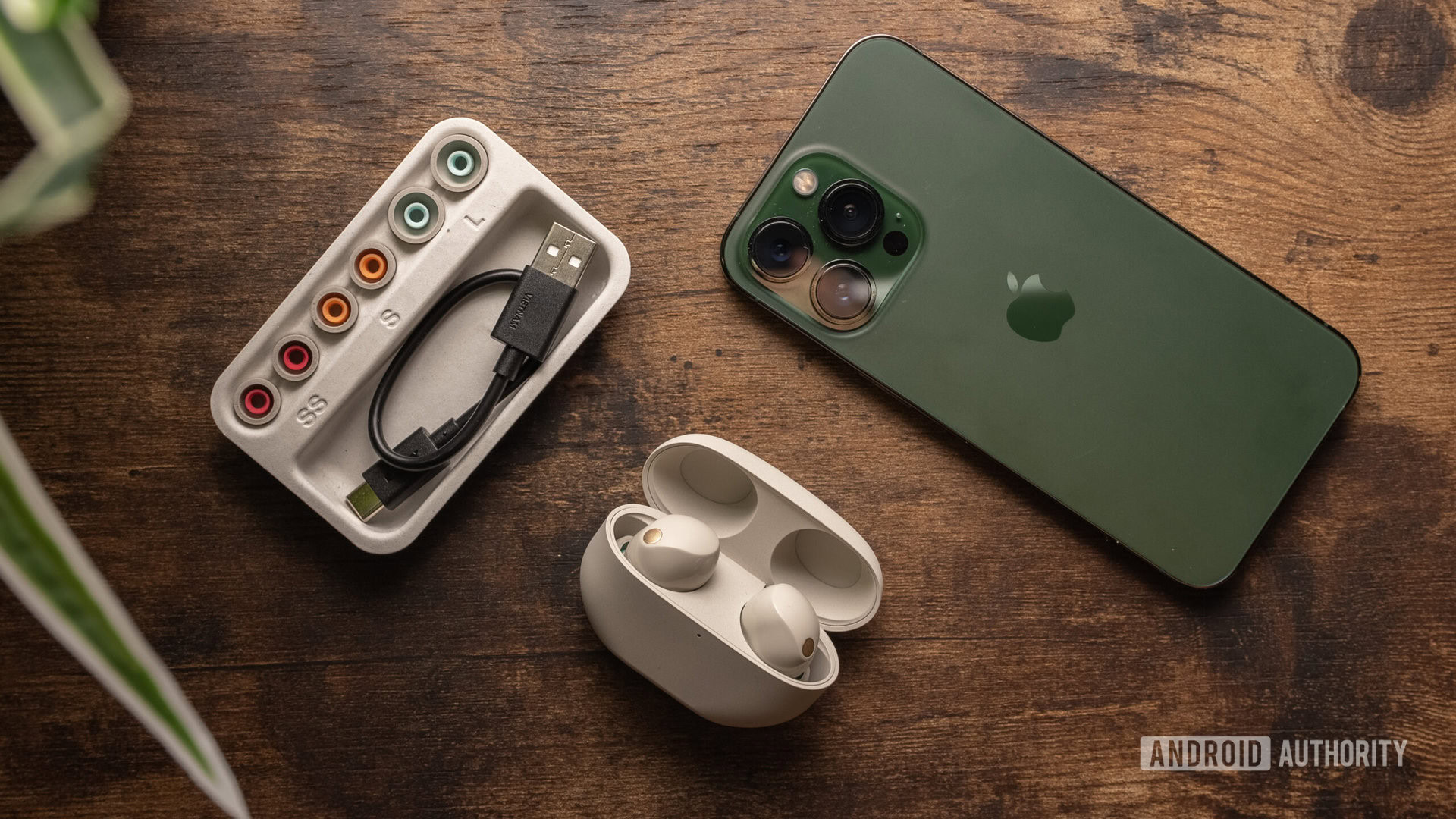
The Sony Headphones Connect app works with Android and iOS. The experience is universal across operating systems. With the app, you can enable audio passthrough to hear your environment with the music. Personalized Sony 360 Reality Audio is one of the most advanced features. This creates an optimized sound profile for the best spatial audio experience. Unlike the WF-1000XM4, the WF-1000XM5 support head tracking when streaming compatible content.
The app also offers a custom EQ module, EQ presets, and listening modes. Listeners can prioritize streaming quality or connection stability, which is useful if they notice playback hiccups while listening to music. Sony debuted these buds with multipoint connectivity, meaning they can run two active connections simultaneously. Like other flagship earbuds, the Google Find My Device app helps locate the WF-1000XM5.
The Sony WF-1000XM5 tick all the boxes no matter your use case.
Most people will like the WF-1000XM5’s default sound, but some may find it a bit bass-heavy. If that is the case, play with Sony’s in-app equalizer. Decreasing the bass output by a few notches will make vocals and cymbal crashes sound more prominent.
Sony includes a host of Bluetooth codecs (SBC, AAC, and LDAC). The earbuds use Bluetooth 5.3 and work with LE Audio-compatible handsets. With noise canceling on, SoundGuys’ testing found the WF-1000XM5 last nine hours and 32 minutes. The case provides an extra 16 hours of playtime and can fast charge the buds. A three-minute charge will supply one hour of listening. Once the charging case needs a top-up, pop it on a Qi mat or plug it in with the USB-C cable.
The Sony WF-1000XM5 are the best noise canceling earbuds for most listeners. You get some of the best pocketable ANC money can buy. Not to mention long lists of customization options from the mobile app and a durable, handsome design. The impressive battery life makes these great earbuds for long flights. If you want earbuds that can do it all and make it easy, pick up the Sony WF-1000XM5. Otherwise, the older WF-1000XM4 will get you most of the way there for ($278 at Amazon.)
What makes them stand out
- Comfortable foam ear tips: The Sony WF-1000XM5 include four sizes of foam ear tips (XS-L) that block out distracting sounds.
- Great ANC: Sony’s noise canceling is some of the best around, and the memory foam ear tips protect you from distracting high-pitched sounds.
- IPX4 rating: You can take these buds to the gym without too many worries.
- Handy mobile app: The Sony Headphones Connect app makes it easy to tinker with the sound to suit your tastes.
- Good battery life: With nine hours and 32 minutes of charge, the Sony WF-1000XM5 can endure more than an entire workday.
Best of the rest: 7 other sets of wireless earbuds worth considering
For most people, we recommend the Sony WF-1000XM5. These earbuds host handy features, are easy to use, and work great with many devices. However, some models might suit you better. Here are some of our other picks:
- Samsung Galaxy Buds 3 Pro: These Bluetooth earbuds have excellent sound quality and next-gen Samsung-exclusive features.
- Apple AirPods Pro (2nd generation): Due to their ANC, spatial audio, and excellent sound quality, these are the default do-it-all buds for iPhone owners.
- Nothing Ear: These exceptionally comfortable buds award a new fully-customizable equalizer to fine-tune your sound.
- Jabra Elite 8 Active Gen 2: Jabra’s latest durable IP68-rated buds bring improved battery life and sound quality, making these workout earbuds an excellent choice for indoor and outdoor use.
- Jabra Elite 10 Gen 2: These well-fitting earbuds boast the best noise canceling capabilities of any true wireless earbuds on the market.
- JBL Tour Pro 3: Those seeking future-proof features and a smart charging case should grab the JBL Tour Pro 3.
- EarFun Air Pro 4: Price-savvy enthusiasts who desire many handy high-end features will enjoy the EarFun Air Pro 4.
The Samsung Galaxy Buds 3 Pro are the best earbuds for Samsung phones

If you own a Samsung phone and want some of the best sound quality and AI features, grab the Samsung Galaxy Buds 3 Pro. Not only are these the latest Samsung Galaxy Buds, but they work well with all Android phones. But truthfully, these buds are best with Samsung devices.
Adorning an AirPods Pro-style stemmed aesthetic, the Galaxy Buds 3 Pro offer a more stable fit than their predecessor. The IP57 rating will protect these buds from a drop in the pool if you fish them out within 30 minutes and can endure small particles. You get three sizes of silicone ear tips with the Galaxy Buds 3 Pro. If you are at a loss, the Galaxy Wearable app lets you conduct an earbud fit test to find the right ones.
Android phones can download the Galaxy Wearable app to access EQ presets and a 9-band custom EQ. Here, you can enable AI translation services and 360 Audio with head tracking. Note: Samsung 360 Audio only works when paired to a Samsung device and when streaming compatible content from services like Netflix, Hulu, or Disney Plus.
The Samsung Galaxy Buds 3 Pro are fairly good at blocking incidental noise and have semi-decent noise canceling. If you can secure a good fit, outside sounds should appear up to 76% quieter with ANC enabled. However, while this may be fine for most, the older Buds 2 Pro block out 84% of unwanted environmental noise. To get noise canceling for better value, consider the Samsung Galaxy Buds 2. Although the ANC is not on par with either pro model, it is the best alternative for Galaxy phone owners. When you want to hear your surroundings, enable Ambient Aware mode.
By default, the Galaxy Buds 3 Pro sound excellent, albeit with a large boost to the highs around 10kHz. While not quite audiophile sound quality, the Buds 3 Pro should please most listeners. Samsung’s latest model also features “super wideband call” functionality, recording up to 16kHz instead of 8kHz. However, the buds do not enjoy effective in-call noise reduction, although a future firmware update should fix this.
The buds support the SBC, AAC, Samsung Scalable Codec, and Samsung Seamless Codec for reliable, high-quality audio from most devices. Samsung’s proprietary codec supports 24-bit audio, but its importance is debatable. Bluetooth 5.4 keeps the Galaxy Buds 3 Pro connected to your device, with support for LE Audio and the LC3 codec when connected to specific devices. Fans can also utilize Auracast to broadcast and share music and to hear venue-specific announcements.
The Samsung Galaxy Buds 3 Pro are an excellent companion for Samsung smartphone owners.
Battery life is smack-dab average here. In our testing, we recorded four hours and 31 minutes of ANC-enabled playtime with the Galaxy Buds 3 Pro. Unfortunately, this falls significantly short of the six-hour battery life Samsung claims the buds can last. It is also shy of their predecessor, with the Buds 2 Pro profiting four hours and 50 minutes on a single charge. You can recharge the case using USB-C or a Qi wireless mat. Wireless PowerShare is also an option with a compatible Galaxy device.
The Samsung Galaxy Buds 3 Pro are some of the best earbuds for Android users. Samsung’s Wearable app has features that let you lower the latency and choose the listening mode. We like that you can use the earbuds for Samsung Dual Audio and zip around with auto device switching. You can even say, “Hey, Bixby,” if you are into that. These are not cheap, but Samsung’s earbuds often go on promotion. Patient listeners may strike gold.
What makes them stand out
- Outstanding audio quality: The Samsung Galaxy Buds 3 Pro have some of the best sound quality on the market.
- IP57 rating: The Samsung Galaxy Buds 3 Pro can handle sweat and dust without worries.
- Ecosystem integration: If you have a Samsung Galaxy device, these earbuds will slide in nicely, but people without one will miss out on some features.
The Apple AirPods Pro (2nd gen) are the best earbuds for iPhone owners


What sets the Apple AirPods Pro (2nd generation) apart from the rest of our picks is how well they integrate into your Apple experience. Aside from hands-free “Hey, Siri,” you get other useful features like automatic device switching. While testing these buds, I enjoyed switching from a podcast on my iPhone to watching a YouTube video on my Mac and back without a hitch. iPhone owners can use Apple’s personalized Spatial Audio with head tracking. I love this feature for movies, but I do not think it adds much to music.
The original earbuds and case are IPX4-rated, although units sold after September 22, 2023, adorn an IP54 rating. This gives you more peace of mind when out and about. Apple also added a lanyard loop and speaker to the case. The latter does not play music but instead emits a sound when prompted through the Find My app. The Apple AirPods Pro (2nd generation) ships with four ear tip sizes (XS-L.) With the XS ear tips, the AirPods Pro are great earbuds for small ears.
This more granular fit also promotes top-notch active noise cancelation. Apple’s noise canceling is consistent across the board, and I loved using it during flights and short bus commutes. Conversely, Apple’s Adaptive Transparency mode filters background noise through the earbuds. Unlike more basic passthrough modes, Apple’s softens the loudness of unexpected and shrill sounds like clattering dishware.
The Apple AirPods Pro (2nd generation) offer excellent ANC and seamless ecosystem integration for Apple fans.
Adaptive ANC and passthrough modes like Apple’s tend to consume a lot of battery. Even still, the AirPods Pro (2nd generation) last almost six hours on a single charge. Combine the standalone battery life with the charging case, and you can enjoy up to 24 hours of playtime. MagSafe and Qi wireless mats work with the charging case. As of September 2023, Apple fans can enjoy ubiquitous USB-C charging thanks to the company’s updated AirPods Pro (2nd generation) case.
Apple does not let you change the sound, but few listeners will feel the need to. I did not miss the absence of a custom EQ much during the review period. These AirPods sound just that good out of the box. The lows are a hair louder than the mids, adding some pleasant emphasis to basslines without making vocals hard to hear. Apple’s adaptive EQ is always enabled and works across operating systems. This feature accounts for how the earbuds fit in your ears. Inward-facing mics register what you hear in real time and adjust the low and midrange frequencies. This way, you always get consistent audio from your AirPods Pro, even with an imperfect fit.
Since the AirPods Pro 2 microphone quality is good and cancels out background noise, these are solid earbuds for work. That said, the mics occasionally dropped my voice when there was background noise like wind.
Again, the AirPods Pro (2nd generation) are the best ANC earbuds for iPhone owners. With Apple, you pay a premium for simplicity and reliability, and many iPhone owners find the price of entry worth the convenience. Non-iPhone owners, keep reading.
What makes them stand out
- Excellent ANC: The AirPods Pro (2nd generation) have great ANC that is better than the first-gen AirPods Pro.
- Good out-of-the-box sound: You get a solid frequency response curve right out of the box with the AirPods Pro (2nd generation).
- Ecosystem integration: The AirPods Pro (2nd generation) work well across Apple devices, giving you access to “Hey, Siri” commands and battery life optimization.
The Nothing Ear are the most comfortable midrange buds you can buy


The fourth iteration of the Nothing Ear buds retain their predecessor’s superior comfort while packing a list of upgraded features. For example, the buds wear an IP54 rating, while the case is sealed from solid particles with its IP55 rating. The buds also ship with three differently-sized ear tips to help secure a tight seal. Weighing just 4.6g, the Nothing Ear is lightweight and comfortable enough to wear for long sessions without suffering ear fatigue.
The updated earbuds also champion the company’s most pleasing sound quality. Utilizing 11mm ceramic diaphragm drivers, the Nothing Ear reproduces music with better clarity than the Nothing Ear (2). They also enjoy a surprisingly wide sound stage that makes it easier to perceive individual instruments in a 360-degree audio sphere. Sure, the default sub-bass boost around 60Hz may be too loud for some. However, it is easy to tinker with your music using the parametric equalizer in the Nothing X app. The built-in hearing test is handy for tuning the earbuds’ frequency response to your ears.
The company’s comprehensive companion app is a must to unlock the full suite of features Nothing Ear has to offer. From dual connection, Bass Enhance, and LDAC support, fans will enjoy the simplicity and fully customizable app parameters. Those sporting a compatible Xiaomi, Nothing, HONOR, or OnePlus smartphone can even utilize the LHDC Bluetooth codec. Similarly, the pressure-sensitive stems can be fully customized for those coming from another earbud brand.
The latest Nothing Ear buds are some of the most comfortable midrange earbuds on the market.
Running Bluetooth 5.3, the Nothing Ear are primed and ready for advanced features like Auracast, LE Audio, and the LC3 codec. In the meantime, fans operating multiple devices can connect the Nothing Ear simultaneously via Bluetooth Multipoint. The buds also support Microsoft Swift Pair and Google Fast Pair for instant pairing with supported devices. Similarly, the earbuds deliver a gaming mode feature for low-latency audio transfers between your source device and the buds.
The upgraded Nothing Ear have exceptional battery life, lasting just over eight hours on a single charge. That is roughly three hours longer than the industry average for true wireless earbuds and two hours longer than the Nothing Ear (2). Additionally, Nothing claims the charging case profits 40 hours of additional playtime. Those in a hurry get 10 hours of juice from a 10-minute top-up, and the case supports wireless charging up to 2.5W.
At ($149 at Amazon,) the Nothing Ear are affordable for what you get. However, those hunting for a cheaper alternative should consider the Nothing Ear A. While you forfeit wireless charging, a custom EQ, and a more robust IP-rated case, the cheaper A-series buds will make an excellent companion for price-savvy musos.
What makes them stand out
- Superior comfort: The Nothing Ear has a small and lightweight form factor, making it extremely comfortable to wear for long periods.
- IP54 rating for the buds and IP55 for the case: Sweat, drips, and dust should be no concern for the new Nothing Ear.
- Battery life: With over eight hours of ANC-enabled battery life, wireless charging, and fast charging, the Nothing Ear are an excellent companion for those constantly out and about.
The Jabra Elite 8 Active Gen 2 are the most versatile workout earbuds

When you think of workout earbuds, you likely envisage a pair of buds that house ear wings, over-ear hooks, or stabilizers. While these help secure a good fit for intense cardio sessions, they are fiddly for everyday use. Thankfully, the Jabra Elite 8 Active Gen 2 are the most versatile buds for work-conscious gym enthusiasts.
Jabra’s proprietary ShakeGrip coating is a rubberized material that helps you secure a good fit without over-ear hooks. For added resilience, the Jabra Elite 8 Active Gen 2 house an IP68 dust and water-resistant rating and ship with an IP54-rated charging case. There are three ear tip sizes to choose from (10mm, 12mm, and 14mm,) and the earbuds are lightweight and pocketable at 5g per bud. The pressure-activated buttons are located along the flat of the buds and control audio playback, song skipping, ANC mode, and answer/end calls. Automatic ear detection and an auto sleep timer are also included, which is handy.
The Sound+ app provides Dolby Atmos for spatial audio, a list of presets, and a five-band custom EQ. Bluetooth 5.3 with multipoint is supported, besides LE Audio compatibility and wireless connectivity via the SBC and AAC Bluetooth codecs. One of the standout features of the Gen 2 upgrade is the LE Audio smart case. This allows you to plug the case into any source device via the 3.5mm-out or USB-C-out and transmit audio from the case to the earbuds. In the app, you can also control ANC and activate automatic switching to HearThrough for phone calls. The buds support Spotify Tap and work well with Google Assistant and Siri.
Jabra's ShakeGrip coating and IP68 dust and water-resistant rating make the Elite 8 Active a compelling choice for working out and everyday use.
Like most workout buds, the Jabra Elite 8 Active emphasize sub-bass frequencies. However, the boost in this range is milder than some of the competition. There is also a slight under-emphasis among the highs above 10kHz. This means you will miss some harmonic nuances in the cymbals and vocals. Nevertheless, the sound quality of the Elite 8 Active Gen 2 is very pleasing. The buds’ six built-in microphones deliver decent-sounding voice capture for work calls. Environmental sounds may cause some artifacts, but the voice is prioritized and intelligible.
The Elite 8 Active Gen 2 house Jabra’s Adaptive Hybrid ANC. This reduces bass frequencies around the 100Hz range by up to 36dB, rendering rumbles from cars and trains effectively mute. The ANC does not handle incidental high-pitched frequencies particularly well, so you must form a good seal using the included ear tips to block these noises. Regardless, the Elite 8 Active should reduce most environmental noise by 80%. The buds last over nine hours when ANC is activated. The case can be charged via USB-C or a Qi wireless pad. When fast charging, you need only juice up for five minutes to gain 60 minutes of listening time.
The Jabra Elite 8 Active Gen 2 are the best earbuds in town for working at the office and breaking a sweat at the gym.
What makes them stand out
- IP68 rating: The Jabra Elite 8 Active Gen 2 are in all but name dust-resistant and waterproof, which is good for people who often sweat or go for runs at the beach.
- Pleasing sound quality: You get a great-sounding frequency curve straight out of the box with the Jabra Elite 8 Active Gen 2.
- Battery life: Given the average battery life of wireless earbuds is roughly five hours, the nine hours of charge boasted by the Jabra Elite 8 Active Gen 2 is nothing short of impressive.
The Jabra Elite 10 Gen 2 have the most powerful noise canceling

In addition to updating its flagship workout earbuds, Jabra upgraded the original Elite 10 with the newer Jabra Elite 10 Gen 2. These bring a list of improvements, most notably to their noise canceling capabilities. These earbuds attenuate bass and sub-bass frequencies by as much as 44dB, reducing the loudness of environmental sounds by up to 85.1%. Judged on attenuation alone, the Jabra Elite 10 Gen 2 are the best noise canceling earbuds our sister site SoundGuys has ever tested.
While aesthetically similar to their predecessor, the Elite 10 Gen 2 have some new and pleasing characteristics. For example, the grippy coating and IP57 water-resistant exterior make them a compelling choice for commutes or exercise. Similarly, the buds ship with three differently-sized pairs of silicone EarGels to help secure a good fit. The angular nozzles, 5.6g weight, and small footprint make the Elite 10 Gen 2 comfortable to wear for several hours.
Like all the best true wireless earbuds, you should download the companion app to get the most out of your purchase. Jabra’s Sound+ app is comprehensive and accesses Dolby Atmos spatial audio, Find My Device, and Spotify Tap. Fans also receive EQ presets, adjustable ANC parameters, and control customizations. The app is essential for conducting firmware updates, although Jabra’s exit from the market may limit future installations coming to fruition.
The Jabra Elite 10 Gen 2 have the most powerful noise canceling of any true wireless earbuds on the market right now.
The Jabra Elite 10 Gen 2 are part of a niche club that can use a 3.5mm connection or a USB source in addition to Bluetooth. Using a special cable and adapter, the charging case’s USB-C port, and the LC3 codec, the case can wirelessly transmit audio to your earbuds. It’s a handy feature for frequent travelers and those who want to engage with entertainment systems when out and about. The buds also run Bluetooth 5.3, support Bluetooth Multipoint, and connect via the SBC, AAC, and LC3 codecs.
Jabra’s latest buds award above-average battery life, lasting five hours and 27 minutes on a single charge. Fans can juice the Elite 10 Gen 2 by USB-C or with a Qi-compatible wireless charging pad. Wall charging the earbuds for five minutes grants one hour of ANC-enabled playback time.
Because of their excellent seal and comfortable fit, the Jabra Elite 10 Gen 2 have very pleasing audio quality. While there is some emphasis in the highs around 7kHz, the buds have enjoyable bass and midrange reproduction. Unfortunately, if you decide to hone your sound, you will find the EQ bands are not labeled. This makes it more difficult to adjust the frequency response to your liking without catching other sounds in the crossfire. Nevertheless, the Jabra Elite 10 Gen 2 are some of the best noise canceling earbuds money can buy.
What makes them stand out
- Excellent noise canceling: With excellent passive isolation and up to 44dB of noise canceling, the Jabra Elite 10 Gen 2 have the strongest ANC capability of any true wireless earbuds tested by our sister site SoundGuys.
- Comfort and fit: The ovoid nozzles, small form factor, and silicone EarGels make the Elite 10 Gen 2 comfortable to wear over long periods.
- 3.5mm and USB-C connectivity: The ability to connect and transmit audio from the charging case to the earbuds is a standout feature that should have been more prevalent long ago.
The JBL Tour Pro 3 have the best feature set

JBL may have produced many earbuds during its time, but the JBL Tour Pro 3 are the cream of the crop. Packed with future-proof features, these earbuds champion the very best next-gen functionalities. Most notably, the charging case is vastly more impressive and intelligent than anything else on the market. Adorning a pleasing touch screen, fans can control ANC, sound settings, Find My earbuds, and more directly from the case.
JBL doesn’t stop there. While some earbud manufacturers have tried their hand at developing transmitter-enabled cases, nothing comes close to the success of the JBL Tour Pro 3. Fans can connect the case with the USB-to-3.5mm cable to any supported device and transmit the audio directly to the earbuds. Those who flit between multiple source devices can utilize Bluetooth Multipoint, and the smart charging case allows Auracast to share audio with your friends.
The earbuds run Bluetooth 5.4 and connect to devices wirelessly over the SBC, AAC, LDAC, and LC3 Bluetooth codecs. The JBL Headphones app is comprehensive and delivers a 10-band EQ, spatial audio, an ear tip fit test, vital firmware updates, and much more. There’s lots to delve into and tons of customizations, including personalizing which settings the case can adjust.
The JBL Tour Pro 3 have one of the most comprehensive and future-proof feature sets of any true wireless earbuds on the market.
Like most wireless earbuds, the JBL Tour Pro 3 wear a lollipop stem with short oval nozzles. However, the housings are larger and heavier than some rivals, making them harder to fit snuggly within the ear canal. JBL mercifully packages four differently-sized silicone ear tips and an equal number of foam counterparts to remedy this. The exterior wears a robust IP55 water- and dust-resistant rating that protects the buds against jets of water and small particles.
Commuters will appreciate the JBL Tour Pro 3’s passive isolation even without foam ear tips attached. However, fans should expect roughly 83-84% of environmental noise suppression with ANC switched on. The earbuds have pleasing transparency mode functionality, and the JBL Tour Pro 3 should last just over eight hours on a single charge with ANC enabled. The case can be placed on a Qi-compatible charging pad to top up wirelessly, and those needing to boost on the fly get three hours of playtime from a 10-minute fast charge.
The JBL Tour Pro 3 sound exceptional. The earbuds award a consumer-friendly frequency response that most people will enjoy with strong bass and pleasing treble. If the default sound isn’t to your liking, you can easily select a new equalizer preset or craft your own EQ in the JBL Headphones app. Taking calls is a breeze and the microphone quality is decent whether at the office or out and about. The earbuds quell ambient noises like office chatter, cars, or wind in a cinch.
What makes them stand out
- Smart charging case: Many people will cherish the ability to connect and transmit audio to the earbuds from an old audio device. The addition of Auracast will also keep the product relevant over the coming years.
- Microphone quality: The JBL Tour Pro 3 quell unwanted environmental sounds more effectively than most competitors.
- Sound quality: The earbuds reproduce audio with a consumer-friendly frequency response that many people will enjoy.
The EarFun Air Pro 4 are the best bang for your buck

If you are in the business of finding the best value for your money, the EarFun Air Pro 4 should be on your list. Wearing a similar exterior to their predecessor, these buds own some marked improvements to challenge more flagship brands. For example, the Air Pro 4 ship with five different-sized ear tips, have an IPX5 rating, and have fully customizable tap controls.
Under the hood, the EarFun Audio app lets you download firmware updates and access two ambient sound modes. There are also five ANC modes, with the strongest setting reducing the loudness of external noises by an average of 75%. “AI Environment Adaptive ANC” intelligently adjusts the ANC strength based on the prevalence of noise around you, while “AI Ear Adaptive ANC” alters the ANC based on how much noise reaches your ear canal.
The app is handy for accessing the earbud’s low-latency gaming mode and using the “Find headphones” feature in case you lose your buds. The EarFun Equalizer profits 30 EQ presets and a 10-band custom EQ for tweaking the sound to your liking. Those unsure how to edit their sound profile can utilize the “My Sound Profile” feature to conduct a hearing test. This builds an EQ preset that is tailor-made for your ears.
The EarFun Air Pro 4 have virtually every major flagship feature you could want at an affordable price point.
Regarding connectivity, the EarFun Air Pro 4 run Bluetooth version 5.4 and have a swathe of supported codecs. These include SBC, AAC, LDAC, and aptX Lossless. The latter begets Android smartphone owners up to 1200kbps, 24-bit/ 96kHz audio sampling. Fans with multiple Bluetooth devices can stream simultaneously using Bluetooth Multipoint, while the buds support Google Fast Pair for instant pairing.
The EarFun Air Pro 4 have impressive battery life, lasting eight hours and 44 minutes on a single charge. The company claims the charging case provides 41 hours of additional playtime, which is handy. The case can be charged with a USB-C cable or a compatible Qi wireless charging mat. Those needing to top up on the fly can enjoy two hours of playtime from a 10-minute fast charge.
While not audiophile-grade, the EarFun Air Pro 4 have a very pleasing default sound profile. The subtle sub-bass emphasis will sound good to most people, and the balance between the bass, mids, and highs sounds natural. One caveat to bear in mind is that activating ANC appears to influence the earbud’s sound profile. In particular, disabling ANC seemingly reduces the prominence of the bass response. The microphone performance is average, which for the price is not surprising.
What makes them stand out
- Sound quality: The EarFun Air Pro 4 have a very pleasing default frequency response that most people will enjoy.
- Bluetooth 5.4 with LDAC and aptX Lossless: It is rare to find affordable earbuds that support high-quality audio codecs, and the EarFun Air Pro 4 delivers.
- Noise canceling: Sure, these won’t rival the Jabra Elite 10 Gen 2 or Sony WF-1000XM5. However, for the price, the EarFun Air Pro 4 have excellent noise canceling that is plenty powerful enough for most use cases.
What to look for in the best earbuds for Android or iOS
There are seemingly endless options when it comes to wireless earbuds. Some earbuds block out all background noise, thanks to their great noise canceling, while others work best with certain phones. Below is our list of questions to ask before buying your next pair of earphones.
Why are you buying earbuds in the first place?
Figuring out your use case can help you determine what features are relevant. While many wireless earbuds come with advanced tech, not everyone wants this or cares to pay for it.
Gymgoers will want to grab a pair of workout earbuds and prioritize durability. This means looking out for a robust IP rating. IP ratings denote how resistant a product is to dust or water. Something with an IPX4 rating can withstand water sprays from any direction. Athletes who chalk up their hands or run on the beach may also want to consider something with dust resistance. The OnePlus Buds Pro 2 earbuds are IP55-rated and have an IPX4 case. Alternatively, the more affordable Jabra Elite 4 Active ($89.99 at Jabra) have an IP57 rating.
Don't pay for features you won't use.
Commuters want active noise canceling to ward off rumbling engines and other distractions. All our picks for the best earbuds have noise canceling; that’s just the direction portable audio has gone. While good noise canceling doesn’t come cheap there are some diamonds in the rough. We recommend the Anker Soundcore Space A40 ($79 at Amazon) as a good pair of cheap noise canceling earbuds. Alternatively, the Sony LinkBuds S often go on sale and currently cost ($148 at Amazon.)
You have plenty of options if all you want are affordable, reliable earbuds. Key among them are the JLab Go Air Pop ($24 at Amazon) and the Sony WF-C500 ($98 at Amazon.)
Whatever you do daily, it’s worth finding earbuds built to handle your lifestyle.
Should you buy Samsung Galaxy Buds if you own a Samsung phone, AirPods if you own an iPhone, and so on?
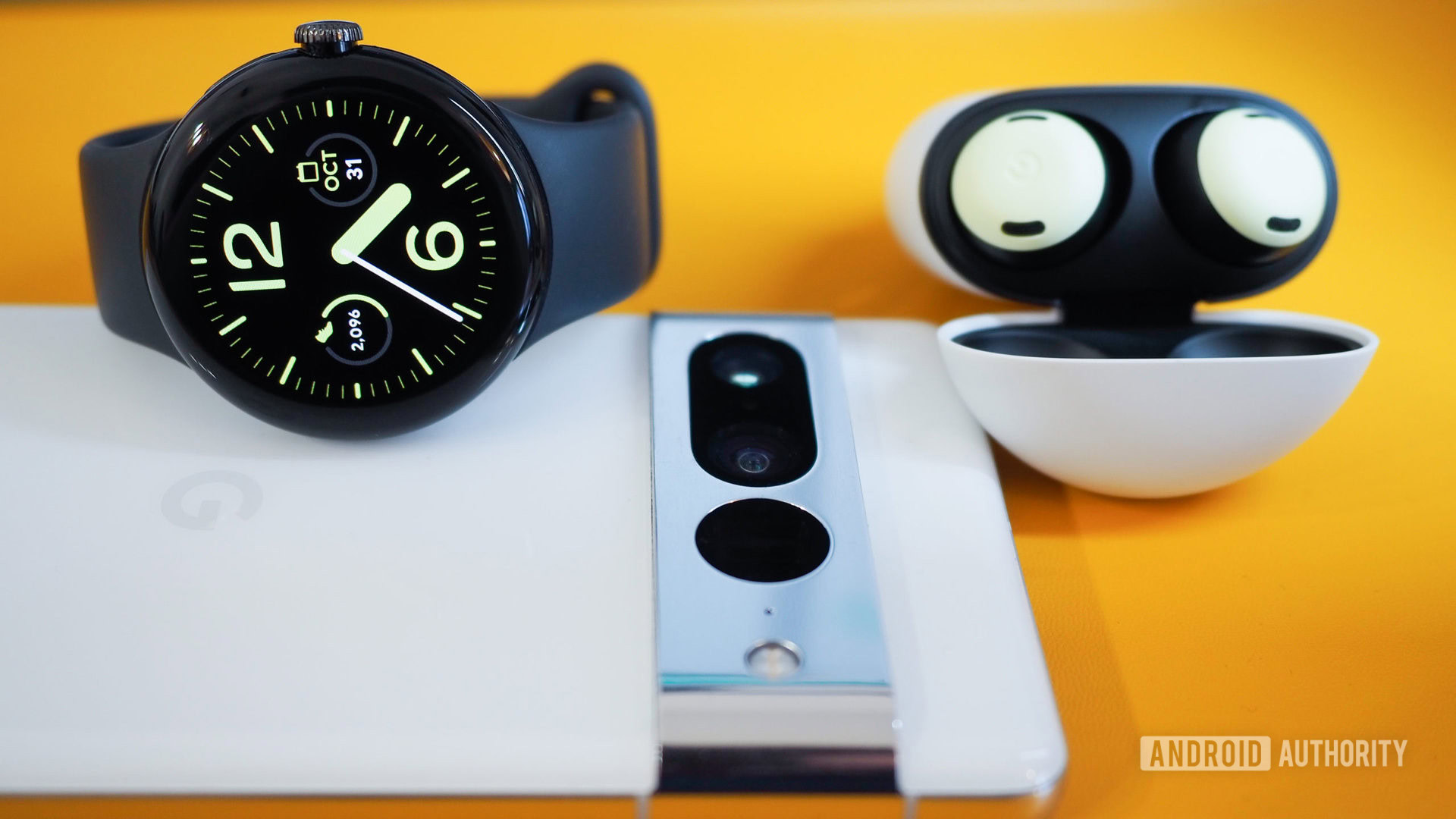
Samsung, Apple, Google, and OnePlus provide exclusive earbud features to their respective handsets. While getting a pair of earbuds tightly woven into your phone’s OS adds convenience and utility, it also locks you further into a given ecosystem. This may not seem like a big deal, but just because you’re a Google fan today, doesn’t mean you’ll feel the same way a year from now. Consequently, we include OS-agnostic picks like the Sony WF-1000XM5, Anker SoundCore Liberty 4 NC, and EarFun Air Pro 4.
For those who insist on matching their earbuds to their phones, here’s a list of key features you usually gain access to:
- Automatic device switching (i.e. switching AirPods audio automatically when moving from an iPhone to an iPad and then to a Mac).
- Spatial audio with head tracking for compatible media.
- 24-bit audio playback.
- Location tracking for earbuds and the case.
- Hands-free voice access to the phone’s native smart assistant.
What is spatial audio, and do you need it?
Spatial audio is an advanced surround sound technology typically powered by Dolby Atmos. In a movie scene, a helicopter may fly above the main character, starting from the left side of the screen and exiting on the right. With spatial audio on, you’ll hear the height effect and panning of the helicopter sounds in your earbuds. Head tracking means that the earbuds communicate with your phone and adjust the audio while you move your head. This keeps you at the center of everything. While spatial audio has its place for movies and TV, the jury is still out on whether or not it adds to the music-listening experience.
Personalized spatial audio is a key feature that separates flagships from mid-tier products.
Pro tip: You don’t need specialty earbuds to use spatial audio. Apple Music, Amazon Music, and TIDAL enable spatial audio with any headphones. Buying a pair of earbuds that explicitly supports spatial audio usually means an app will personalize the sound based on your ear anatomy, or that it supports head tracking.
Does 24-bit audio matter?
While 24-bit audio is excellent for marketing, it doesn’t mean much when listening to music. Simply put, our brains can’t process the dynamic range of 24-bit, Hi-Res audio. Further, we can’t perceive the higher frequencies that lossless audio transmits. Audio engineers reap the greatest benefits of 24-bit audio files, as there is significantly more leeway for editing.
What are Bluetooth codecs?
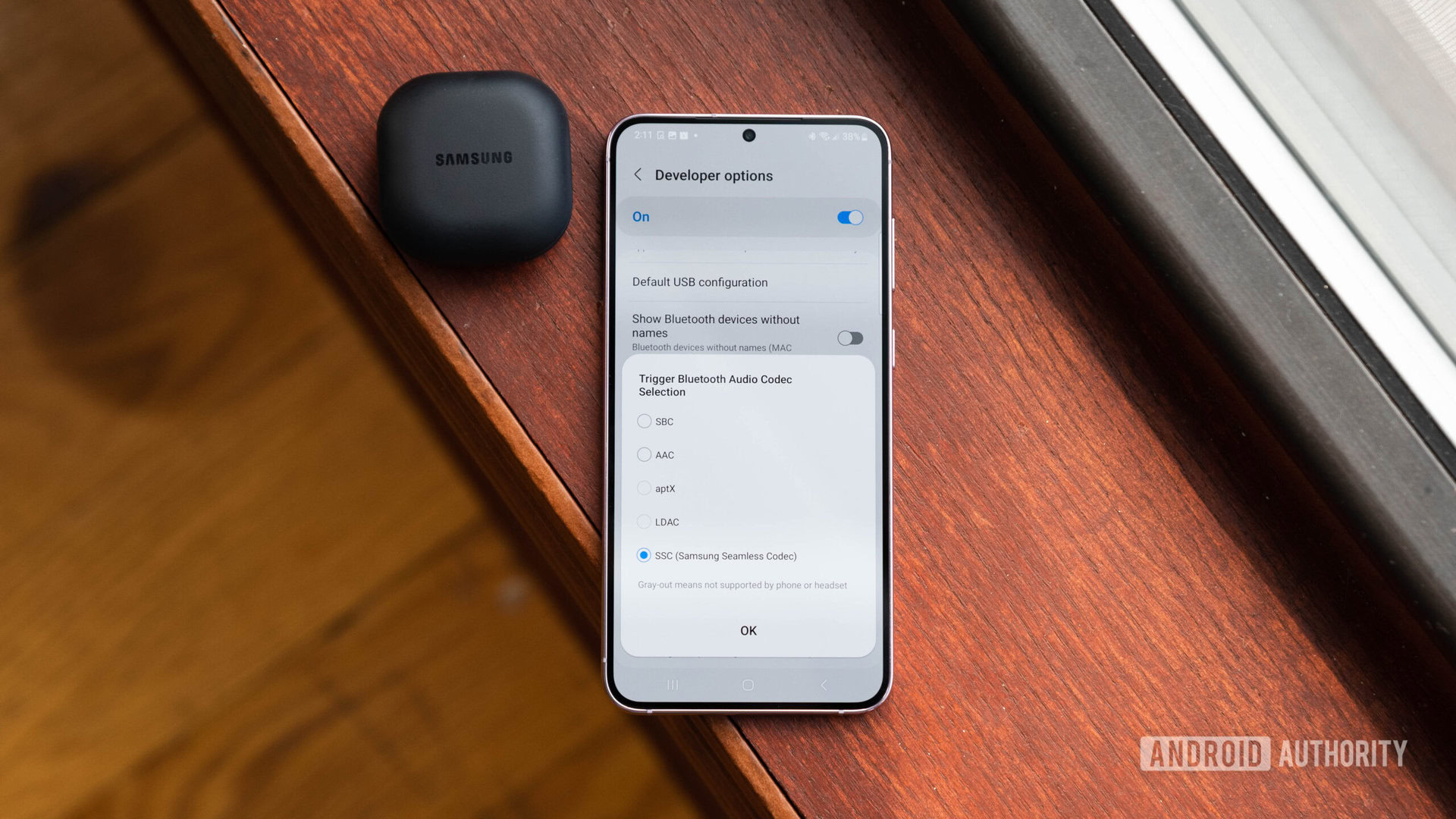
A Bluetooth codec determines how Bluetooth transmits audio data from your phone to your wireless earbuds, headphones, or speakers. This gets complicated. A good bit of guiding knowledge: AAC is the best Bluetooth audio codec for iPhones, and some form of aptX is best for Android phones. If you have a phone that supports a proprietary codec (e.g., Samsung Seamless Codec on the Galaxy S24,) you will get the best audio quality when paired with earbuds that support the Samsung Seamless Codec.
Latency problems arise with certain codecs and handsets. For example, AAC can cause noticeable audio-visual lag when streaming from certain Android phones. You may also encounter audio quality issues: LDAC is not technically Hi-Res.
How do you know if earbuds have good sound quality?
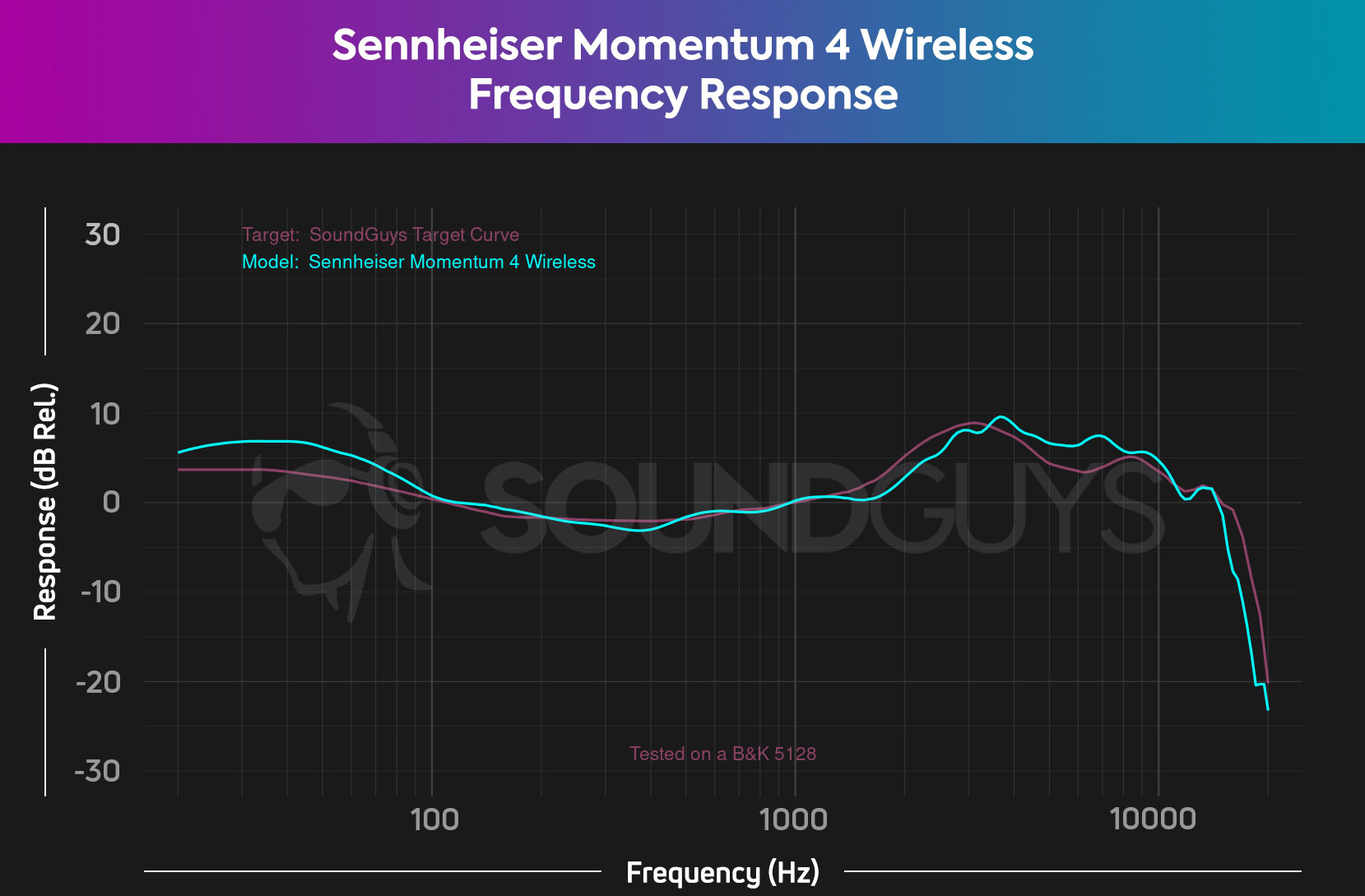
Whether or not earbuds sound good is entirely up to you. Generally, there are a few hallmarks of a “good” frequency response for consumer earbuds and headphones. Most earbuds have a frequency response with a light bass boost, relative to the mids, with notably louder treble. You’ll find this across the board. The frequency response will generally follow our sister site SoundGuys‘ headphone preference curve (pink trace.)
How do you equalize the sound?
Many companion apps include custom EQ, but few teach you how to use it. For the best sound, reduce the volume of frequencies that are too loud rather than boost the frequencies that are too quiet. For earbuds that sound too bassy, reduce the bass before boosting the treble and mids. We recommend this method of equalizing because boosting quiet frequencies can add distortion.
Pay close attention to frequencies between 250-1,000Hz. This is where most instrument and vocal fundamental frequencies lie. If you start cutting this range and your music sounds too quiet or “hollow,” you may need to bring the loudness back up. You can do this with any third-party EQ app or custom EQ module in a proprietary app.
How do you know if earbuds fit well?
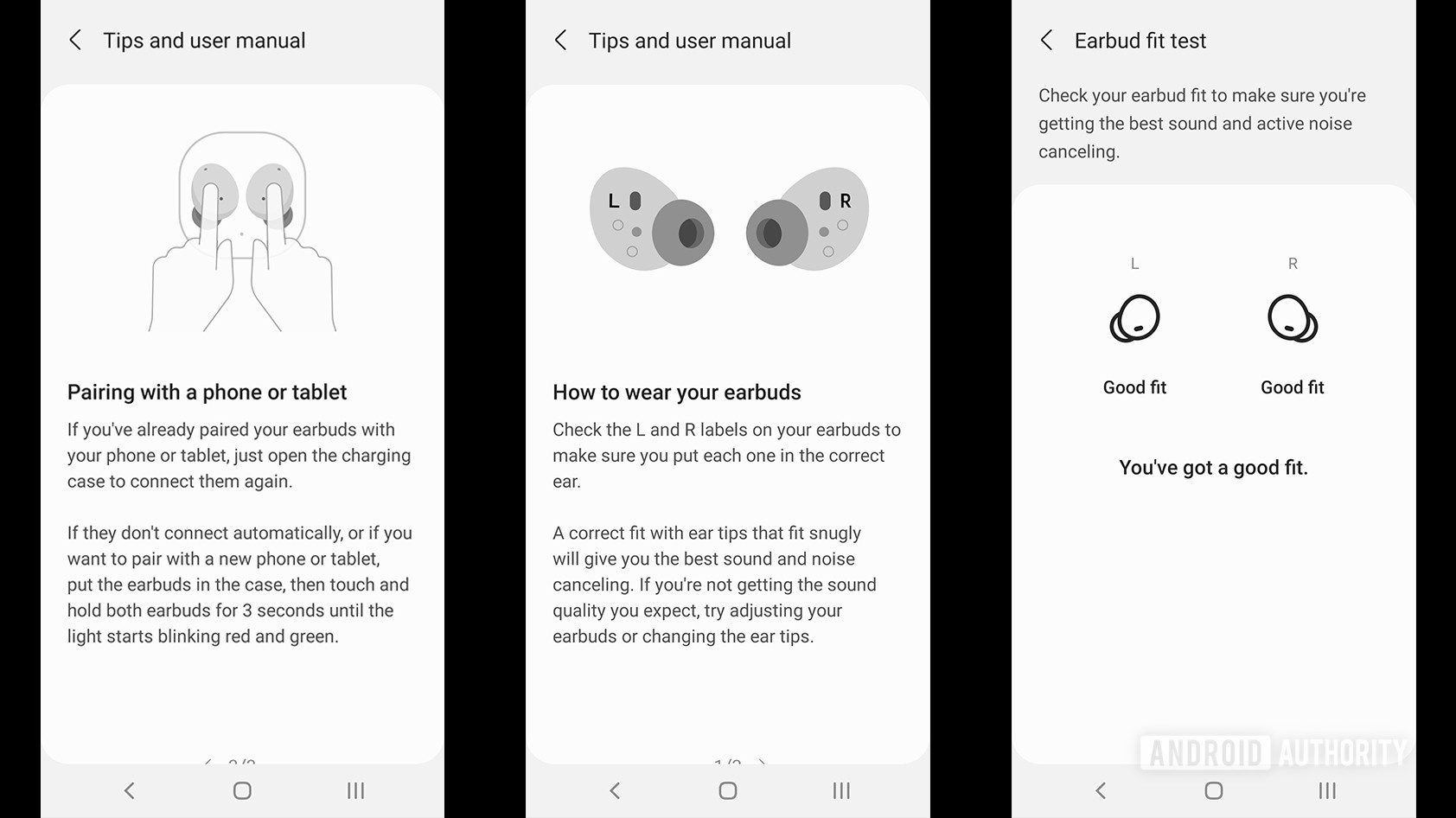
The simplest way to determine if your earbuds fit well is to use the guess-and-check method. Most earbuds come with three sets of ear tips, ranging from small to large. We recommend starting with the medium-sized ear tips and inserting the earbuds. Properly fitted ear tips will create a gentle seal where the tips meet your ear canals. Try wiggling your ears or jostling your head a bit. If the buds stay in place, they fit well.
Ear tips that are too small will cause the earbuds to fall right out of your ears when you shake your head. You will still be able to hear a lot of background noise with ear tips that are too small. Ear tips that are too big will create uncomfortable pressure on your ear canals. These may also pop out with a head shake.
Another way to test if your earbuds fit well is to use an in-app ear tip fit test. Many apps offer a test. You often get an ear tip fit test when matching your earbuds to your phone. You can run an ear tip fit test with most Galaxy Buds and a Galaxy phone. It also works with most AirPods and iPhones.
How long do earbuds last?
Some of our selections for the best wireless earbuds have nine-hour or higher battery life ratings, but earbud batteries generally last around five hours. Power-hungry features like noise canceling, spatial audio, and high-quality codec usage drain the battery faster. Earbuds house tiny lithium-ion cells that can’t compete with over-ear headphones.
If you’re not into the best wireless earbuds, here are the best headphones
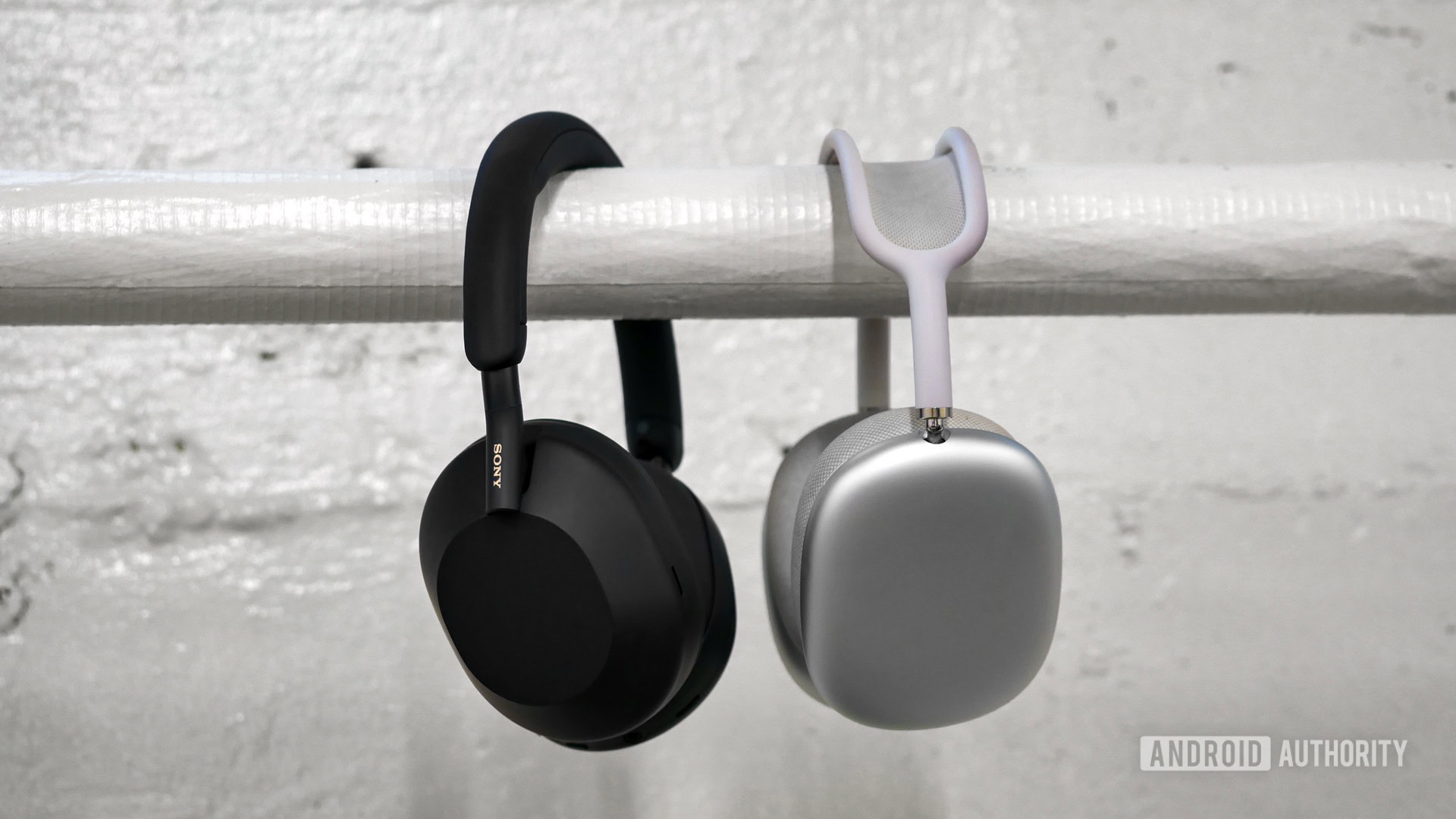
Even though this list covers the best earbuds you can buy, we know that not everyone likes how earbuds feel. If that resonates with you, take a second to browse some of our favorite headphones. All our picks feature noise canceling, a comfortable fit, and good battery life.
- Sony WH-1000XM5 ($387 at Amazon): The Sony WH-1000XM5 noise canceling is top-notch. Like the WF-1000XM5, the headphones’ passive isolation impresses us. Sony’s bass-heavy sound may not please everyone, but it’s easy to EQ away through the Headphones Connect app. The battery lasts 31 hours and 53 minutes with ANC on, which is great given the demanding features. Unlike many other headphones, these support the SBC, AAC, and LDAC Bluetooth codecs for high-quality audio to any device. Microphone quality is stellar, especially when taking calls from loud environments. Whether you have an Android phone or an iPhone, the WH-1000XM5 are the best noise canceling headphones for any application.
- Apple AirPods Max ($499 at Amazon): Like the AirPods Pro (2nd generation), the AirPods Max work best with iPhones. The AirPods Max cancel out more low-frequency noise than Sony’s, so you’ll hear even less noise during your train commute or flight. When paired to an iPhone, you can enable Apple’s Spatial Audio with head tracking and access Siri with your voice. Switching between different Apple devices is as easy as locating the headphones through Apple’s Find My network. Like the earbud-style AirPods, the AirPods Max sound great by default. Bar none, the Apple AirPods Max are the best noise canceling headphones for iPhone owners.
- Bose QuietComfort Ultra ($429 at Amazon): Bose’s headphones feature a modern and lightweight design with a multifunction button for controlling audio playback. Unlike the Bose QuietComfort Headphones, the QuietComfort Ultra connect via a 2.5 to 3.5mm TRS cable or Bluetooth 5.3. Those sporting an Android phone with Qualcomm Snapdragon 888 or newer can use the high-res aptX Lossless Bluetooth codec. The headphones retain over 27 hours of constant music playback while topping up for 15 minutes rewards over two hours of charge. The large, comfortable, and dense earcups seal to the head well. Combined with the headphones’ ANC, low drones like bus engines and airplane whines have their loudness reduced by roughly 87%. If you can afford it, the Bose QuietComfort Ultra offer high-performing noise canceling that will stay relevant in the future.
- Sennheiser ACCENTUM Wireless ($179.95 at Amazon): These headphones are exceptionally comfortable and offer a mix of compelling features for a reasonable price. In particular, the headphones have a well-balanced sound quality, a 5-band custom EQ in the Sennheiser Smart Control app, and ANC that reduces unwanted noise by 75%. While the 3.5mm has been nixed, the ACCENTUM Wireless support USB-C audio for lossless listening. Battery life is excellent, lasting nearly 47 hours with ANC enabled. The headphones run Bluetooth 5.3 and support the SBC, AAC, aptX, and aptX HD codecs. Fans can also utilize sidetone adjustments, device management, and vital firmware updates in the companion app. Like most over-ear headphones, the ACCENTUM Wireless do not have an IP rating. However, their feature-to-price ratio is one of the best on the market.
Why you should trust us and how we test the best wireless earbuds
At Android Authority, we have a long history with tech devices. Along with our sister site, SoundGuys, we have tested hundreds of earbuds and headphones over many years. Our team of experts personally uses each product in their daily lives, at the gym, and on the go to see how they stack up in the real world. We select the best of these to make it onto our list of the best earbuds. We focus on user experience and sound quality, and to that end:
- We use the product for at least a week, listen to different music genres, and perform various activities.
- We note the comfort, construction quality, materials, and ease of use.
- We comb through any associated companion apps to ensure they work well with the earbuds.
- We make phone calls to check mic quality in the real world.
- We subject each earbud model to the same battery test, sound quality and frequency response tests, and isolation and ANC tests.
- We routinely update old reviews when new features, fixes, or problems are discovered.
We’re thorough and don’t take this lightly! We recognize every model of earbuds is different. So, we determine what makes them unique (if anything) and how they stand out in the market. Then, we check to see if they might be missing anything important or have flaws that would knock them out of the running. Finally, we make objective measurements of everything we can. That includes battery life, frequency response, isolation, and noise canceling performance.
You can trust that our experts put each device through the wringer. We also revisit our reviews periodically to see how the products have held up over time.
Top wireless earbuds questions and answers
There are many premium earbud brands to choose between. For example, iPhone owners will enjoy the seamless integration of the Apple AirPods Pro (2nd generation), while Samsung smartphone owners should consider the Samsung Galaxy Buds 3 Pro. Sony makes excellent OS-agnostic earbuds. Most favorable are the Sony WF-1000XM5.
Due to people’s personal preferences, there is no official league table for what constitutes the best wireless earbuds brand. However, the Sony WF-1000XM5 ($298 at Amazon) earbuds are favored among Android and iOS smartphone owners alike. They deliver excellent sound quality with up to 50dB of noise canceling, eight hours of battery life, and a list of high-end features. For these reasons, as well as their broad appeal, the Sony WF-1000XM5 could be considered the best true wireless earbuds.
True wireless earbuds are often considered better for working out than over-ear headphones and wired earbuds. They also provide a tangle-free listening experience that many people find enjoyable and convenient.
While there is no quantifiable data regarding which wireless earbuds award the longest battery life, the Sony WF-1000XM5 are revered for profiting over nine hours of continuous ANC-enabled listening time.
Thank you for being part of our community. Read our Comment Policy before posting.